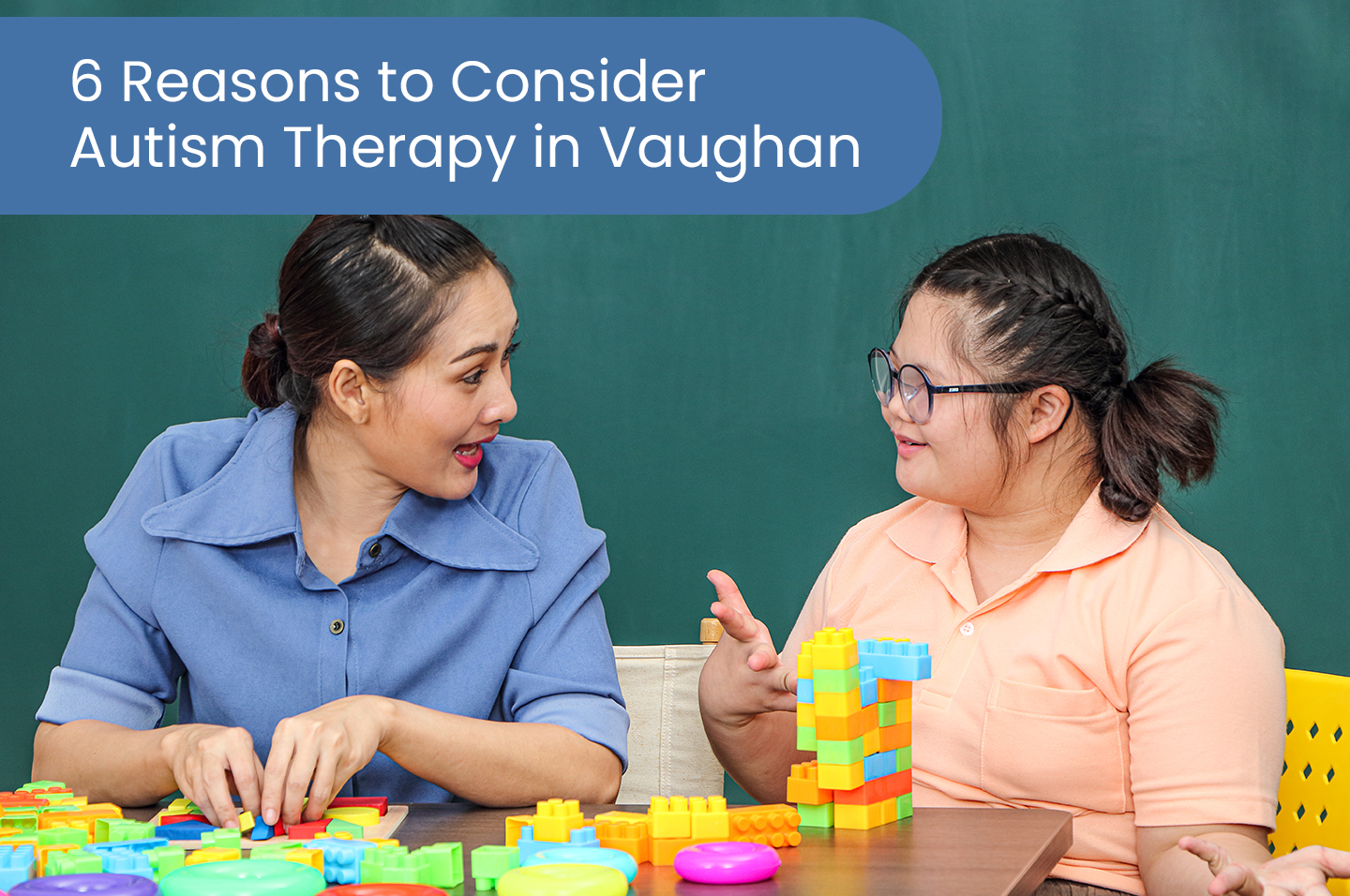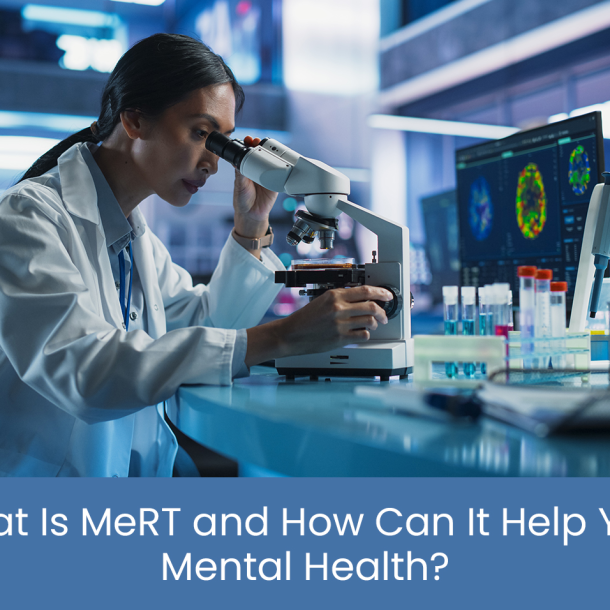
6 Reasons to Consider Autism Therapy in Vaughan
- Home /
- 6 Reasons to Consider Autism Therapy in Vaughan

Autism is a complex neurodevelopmental disorder characterized by persistent challenges with social communication, restricted interests, and repetitive behaviours. It’s a spectrum disorder, which means that every child with autism experiences the disorder differently. Some may need minimal support, while others benefit from more significant assistance in their daily lives.
Parents strive to provide the best care for their children and support them in any way they can. However, it can sometimes be difficult to determine what kind of support is needed. While there’s no cure for autism, many treatments have been shown to help individuals, including children, and can make a life-changing difference.
If you’re considering therapy for your child, it can be one of the most valuable steps in supporting their development. Here are six reasons why autism therapy is worth exploring:
1. Early intervention maximizes potential
One of the most important reasons to consider treatment for autism is the impact of early intervention. Research shows that children who receive therapy at a young age develop stronger cognitive, social, and behavioural skills compared to those who start later.
During early childhood, the brain undergoes rapid development, creating an optimal window for learning and growth. This period of heightened neuroplasticity makes it the best period for children to strengthen social, communication, cognitive, and emotion regulation skills.
2. Autism therapy strengthens communication skills
Many children with autism experience speech delays, verbal, and non-verbal communication challenges. These difficulties can lead to feelings of frustration, social isolation, and misunderstandings. Attending an autism therapy clinic can provide structured support to help children build effective communication strategies.
Autism therapy helps by:
- Expanding vocabulary: Teaching new words and helping children use them correctly.
- Developing alternative communication strategies: Introducing tools like picture boards, sign language, or leveraging technological devices.
- Improving non-verbal communication: Helping children understand and use facial expressions, gestures, and body language to improve social interactions.
- Building conversational skills: Encouraging back-and-forth dialogue, responding appropriately to questions, and staying on topic.
3. Social skills training improves friendships and interactions
For many children with autism, social interactions can feel overwhelming. Many struggle with reading body language, making eye contact, or taking turns in play. Therapy can teach children how to:
- Participate in team activities and collaborative tasks.
- Recognize and respond to social cues.
- Express their own emotions appropriately.
- Interpret tone of voice and emotions in others.
For example, a child who avoids playing with other children at recess may feel confident enough to join a group game after attending therapy at an autism treatment centre
4. Therapy helps manage challenging behaviours
Meltdowns, repetitive movements (stimming), and difficulty with changes in routine are common among children with autism. These behaviours are often a form of communication or a response to sensory overload. Without the right coping strategies, these challenges may interfere with school, relationships, and daily tasks.
Therapy helps by:
- Identifying triggers that cause distress.
- Teaching alternative coping strategies to manage stress and anxiety.
- Improving flexibility with changes in routine and unexpected transitions.
If, for example, frustration leads a child to throw objects, therapy may introduce strategies like asking for help or using a stress ball as a more effective coping technique.
5. Therapy provides greater independence in daily life
Daily tasks like brushing teeth, getting dressed, or eating meals can be difficult for children with autism. Therapy helps build confidence and autonomy by breaking these routines into smaller, more manageable steps.
Autism therapy builds independence by:
- Teaching step-by-step routines for managing daily tasks, like personal hygiene.
- Helping individuals develop problem-solving skills.
- Encouraging autonomy in decision-making.
6. Family and caregiver support is offered
Parents play a key role in their child’s well-being, but it’s not always easy to know how to respond to challenging behaviours or encourage communication. Therapy programs often include parental resources to help families support their child’s development at home.
Therapists guide parents and caregivers on:
- How to respond to meltdowns calmly and effectively.
- Reinforcing positive behaviours with praise and rewards.
- Encouraging language development through daily interactions.
- Managing their child’s sensory sensitivities.
Understanding MeRT Therapy for Autism
While traditional autism therapy focuses on behavioural and communication strategies, new advances like Magnetic e-Resonance Therapy (MeRT) are showing significant promise in supporting children with autism.
How does MeRT work?
MeRT, a specialized form of transcranial magnetic stimulation (TMS), is a cutting-edge, safe, non-invasive therapy that tailors treatment to each individual’s unique brain activity.
The process begins with a quantitative electroencephalogram (qEEG), which maps brainwave patterns to identify areas of dysregulation associated with speech, emotion regulation, cognition, and sensory processing.
Using this data, a personalized treatment plan is created, and a magnetic coil is then placed over a targeted brain region to stimulate underactive or dysregulated areas of the brain. MeRT has been demonstrated to enhance:
- Speech and language development: Children experience increased verbal expression and comprehension.
- Mood regulation: MeRT can help manage anxiety, irritability, and mood fluctuations by stabilizing neural activity in the brain.
- Social engagement: Many children experience improvements in eye contact, responsiveness, and communication with others.
- Sensory processing: MeRT has shown promise in improving tolerance to loud sounds, textures, and other sensory stimuli.
- Behavioural improvements: Children can show reductions in impulsivity, aggression, and repetitive behaviours after completing MeRT therapy sessions.
Safety Considerations of MeRT
MeRT is a non-invasive, medication-free therapy that is well-tolerated. Unlike medications, it does not introduce chemicals into the body, making it a promising option for families looking for alternative treatments.
MeRT treatment protocols have been incredibly successful in improving an array of health conditions, including autism, major depression, anxiety, post-traumatic stress disorder, and concussions.
Contact Neurosync Brain Centre for Autism Therapy in Vaughan
Autism is not a one-size-fits-all condition. While there is no cure, early therapy equips children with the tools they need to communicate, regulate emotions, and navigate the world more effectively.
Magnetic e-Resonance Therapy (MeRT) offers a tailored and science-driven approach by combining advanced neurotechnologies to target each individual’s unique brain patterns and optimize developmental progress.
Neurosync Brain Centre specializes in personalized brain health and neuromodulation. Using state-of-the-art MeRT technology, our experienced clinicians deliver tailored treatments for a broad range of neurological conditions, including autism.
To schedule an appointment or learn more about autism therapy in Vaughan, call +1-365-799-8438 or complete our online contact form. One of our dedicated professionals will follow up with you shortly to confirm scheduling.
Working Hours
Email: neurosyncbtc@outlook.com
Woodbridge. ON. L4L 1A6

